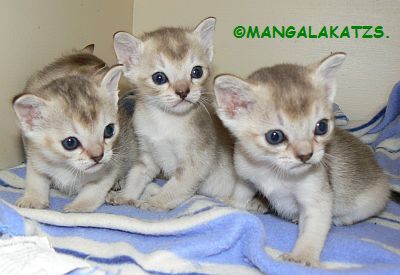Adopting a Kitten From Mangalakatz
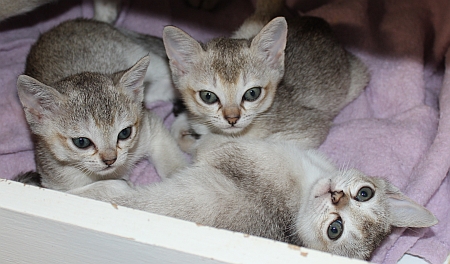
We Have New Singapura Kittens Born :
While there is an extraordinary amount of
information on this page, we request all potential kitten adoptees read
all information on this page prior to contacting us for a kitten. This
will save us both time as many of your questions may already be answered
on this page.
Once read for
current kitten availability, please refer to recent posts made on our
Facebook page:
Mangalakatz: Singapura Cat Breeder
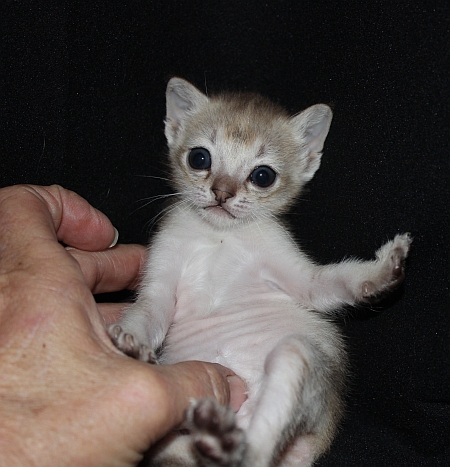
General Information about adopting a kitten from Mangalakatz
At Mangalakatz, we strive to ensure your new
furry family member is healthy, well socialized, and confident kitten,
free of genetic birth defects/conditions. As we breed multiple breeds of
cat, there are some slight variances between each breed in regards to
the adoption process due to the way each breed develops differently.
However, all kittens adopted from Mangalakatz, go to their new homes:
- Desexed (non negotiable for pet buyers - some registered breeders may be eligible to adopt an entire kitten at our discretion). Legislation in Victoria requires all kittens once desexed to remain at Mangalakatz for a minimum period of one week post surgery. This allows the kitten to heal from their surgery and any stitches requiring removal to be removed prior to the kitten going to their new home.
- Veterinary Health Certificate
- Desexing certificate signed by our veterinarian
- Thermal Mini Microchipped & registered with Global Micro Animal Registry, Registered in your name or transferred at our expense to you. (Latest advanced microchip which enables the cat/kittens temperature to be checked via the microchip)
- Vaccinated with Two F3 vaccine (standard vaccine)
- Wormed regularly with a tablet and/or spot on treatment. You kitten will be treated for intestinal worms, heartworm and fleas immediately prior to adoption for your convenience
- Fully litter trained using either Breeders Choice paper based pelletised litter and Tofu organic litter
- Certified ANCATS registered pedigree
- Comprehensive kitten care notes supplied before the kitten is picked up/delivered and additional goodies provided on collection to make the transition into your home less stressful for both you and your kitten
- 6 Weeks Free Pet Cover Animal Insurance.
- Sample bags of food and litter to make the transition into your home easier. Unfortunately, it is not possible to provide these items to interstate/overseas adopters as there is no safe way to include these items in the carry box with your kitten.
- All kittens adopted from Mangalakatz come with lifetime support. We also welcome receiving photos/updates on the kitten you have adopted from us as it grows.
We do have a waiting list for all breeds of kittens. Should you wish be added to our obligation free waiting list, please contact us via the contact us page of this site.
No kitten will leave our cattery if you do not have a suitable cat safe carry box. If you do not have one of these prior to collection of your kitten, carry boxes are available to purchase at the cattery.
We also provide reduced rate boarding for previous kitten buyers in the event of your cat/kitten requiring boarding when you are going away on holiday or other reasons.
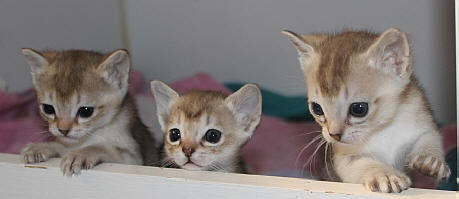
Visiting Mangalakatz
Legislation for those catteries that holding a Recreational
Breeders Domestic License (REC), which we do, are bound to maintain a high Bio
Security status within the cattery and kitten nurseries. This
unfortunately means it is not possible for us to allow kitten and/or
cattery visits into these areas.
Sadly, due to rising thefts from breeders, we also have to consider the
safety and security of our breeding cat and any kittens we currently
have in the cattery.
Once we build a purpose built viewing/reception area this may change,
however until such time, we do hope all kitten adoptees understand. When
picking up your kitten this will be allocated to one of the nurseries
only where your new kitten will be waiting for you with open paws.
To set your mind at ease, we have been inspected and approved by our
local council for the REC requirements regarding cattery management
and kitten raising facilities.
Adopting a Singapura Kitten from Mangalakatz
Adopting a Singapura
Alas, there are never very many female kittens in Singapura
litters, therefore if you wish to adopt a female Singapura, you may find
you will need to be very patient as it may take a while for us to be
able to breed a female kitten for you. are more likely to be available
first.
Collection of your kitten
As Singapura's are the worlds smallest cat, these kittens do
take slightly longer to reach the required weight (1.3kg) for desexing.
Therefore you will be unable to collect your kitten from us until
approximately 14 to 16 + weeks of age after they have recovered from their
surgery.
Adopting a Singapura kitten for breeding purposes
We do not participate in, nor sell any Singapura cats or kittens to
breeders involved in any Singapura outcross programs. Therefore, we
request you do not ask for a kitten for these purposes as refusal may
offend.
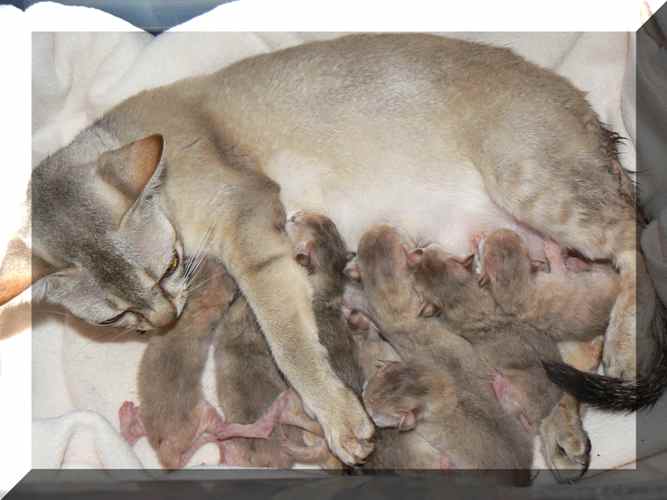
Singapura Queen with 8 kittens - a world record number
of kittens for a Singapura Queen
Costs associated with adopting a kitten or cat from Mangalakatz
Upon requesting to adopt a kitten from
Mangalakatz, you will be sent an email requesting your response to a
series of questions, a copy of our pet/breeding contract and our banking
information for deposit transfer. While this may seem frustrating to
you, it is essential you respond to all questions in as much detail as
possible so we can ensure your home is the correct fit for one of our
kittens.
The Adoption fee to adopt one of these very special kittens is $2500.au
The deposit required to reserve a kitten from Mangalakatz is $500.00.
Once your deposit has been received, you will receive an email with
kitten care notes regarding the requirements of your kitten upon arrival
at your home, including diet and other general information. You will
also be provided with a receipt for your deposit.
Please note: Deposits are non-refundable 3 days from
deposit date.
Updated photos of your new baby will usually be placed on this website
and/or our facebook page as regularly as possible by us. You may also
receive emailed photo updates from us.
Unless you have previously arranged to make regular repayments to pay
off the adoption fee or Adoption cost for your kitten, you will receive an invoice for
balance due when your kitten reaches desexing weight.
Should you wish to
arrange a regular payment plan, please contact us, you will find we are
very flexible and understand the adoption fees associated with adopting
a kitten from us can be a large amount of money from your budget.
We currently do have a waiting list, so
please let us know if you wish to be added to our waiting list to ensure
that you are in line for your new baby sooner than later.
PLEASE NOTE: We do not sell breeding cats within Australia.
At Mangalakatz, we
reserve the right to cancel the sale of a kitten at anytime prior to the
kitten being ready to go to it's new home. In the event of this occurring, your deposit will
be refunded.
Interstate Transportation of your Kitten
Our kittens regularly travel to other Australian States &
Internationally to their new homes. However, this does add additional
costs to the adoption fee. These costs include, but are not limited too:
- Airfare
- Approved Carry Container (PP10/PP20/PP30/PP40)
- Courier Transportation from our cattery to Melbourne Airport
We do our utmost to ensure your kitten is not only safe during their transportation, but also comfortable to reduce the stress levels your kitten may experience. These procedures include, but are not limited too:
- A nice warm blanket or sleeping bag is supplied for your kitten to snuggle into.
- A soft toy to keep your kitten entertained
- All their paperwork (vaccination card, health certificate, desexing certificate, pedigree papers and any other additional paperwork) will be included inside the carry box underneath the blanket in a plastic envelope to ensure it remains dry should your kitten have an accident during the trip.
- The carry box supplied has a specially fitted base so that in the event of your new kitten have an accident in their carry box during the trip. it will go straight through to the bottom of the box and your kitten will be remain dry. However, as an additional method to ensure your kitten does remain dry, a puppy pad / wet/dry liner will also be included in the carry box for additional warmth and comfort of your pet.
- We do expect a phone call or email from you once you collect your kitten up from the airport so we know your kitten has arrived safely and is OK. This will save us from worrying about our baby being lost somewhere at the airport.
Remember: When adopting and transporting a kitten
from another Australian State - there is no additional charge to have
two kittens in the same carry box, and two kittens is always better and
much more fun than one!!
All travel costs and any outstanding balance of the adoption fee for
your kitten must be paid 14 days (3 weeks if overseas) prior to the
kittens departure date.
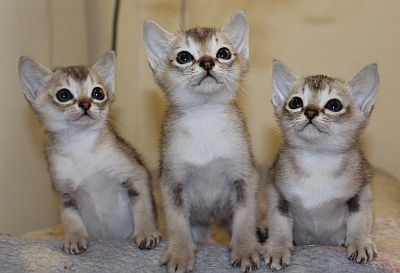
Feeding your new cat or kitten
Diet is one of the most important aspects about caring for your
kitten/cat. After much research into the feline diet, we recommend a raw
diet for your kitten/cat, information on feeding raw will be supplied to
you before your new baby arrives. A small amount of Grain Free" Healthy
Everyday Pets" dry biscuits
may be used as a treat, but not as a meal.
Raw Diet Vs Processed Cat Food
The source of this information is from "Nutrition of the
Domestic Cat" by VH Menrath, BVSc, BAgr, MACVS, as published in "Target"
all breeds magazine of the Council of Federated Cat Clubs of Queensland
and printed in an issue of "National Cat"
Your Cat is a True Carnivore
It is typical of the cat's independent nature that
although it has been a companion of man for many centuries, it has generally refused to change its dietary habits. The cat has
continued to hunt and provide for itself at every opportunity. In its natural state, the cat is a healthy and resourceful animal and
as a hunter is second to none.
Recent nutritional studies have proved the cat to be a pure carnivore.
It is unable to exist in its natural environment without a diet of tissues and organs of other animals. A wild cat eats all
of its prey - hair, skin, flesh, bones and internal organs.
Since the wild cat is a healthy animal with excellent teeth and bone
structure, it has given us some clues in the search for a good diet for our domesticated companions. Cat owners often
unknowingly cause nutritional diseases in their animals in a quest to provide a balanced diet.
Research studies indicate the cat's dietary requirements are unique.
Protein
The cat has an extraordinarily high requirements for protein. An adult
cat needs 20% of its total daily calorie intake to be protein. This is about five times that required by a dog. Kittens
need 30% protein for normal growth and development.
The majority of the protein has to be of animal origin. If a cat is fed
exclusively on tinned dog food, it loses weight gradually and eventually becomes irreversibly blind.
Vitamin A
The cat is unable to synthesize Vitamin A from the plant pigment
carotene and has to eat the vitamin in its true form. Cats have a high Vitamin A requirement, but excessive doses are more
disastrous then deficiencies.
Raw liver is an excellent source of Vitamin A but cats often become
addicted to eating liver, which causes excess bone tissue to be laid down in joints. The Vitamin A poisoning eventually causes
permanent stiffness of the legs and neck.
Low grade Vitamin A deficiencies occur quite commonly, especially in
breeding catteries, where stress caused through viral respiratory infection or pregnancy results in a rapid depletion of
Vitamin A stored in the liver. This not only results in prolonged recovery from illness but is a common cause of sterility,
reduced litter size and birth defects such as flattened chests and cleft palates.
Vitamin D
Vitamin D is required for normal bone growth and development. Cats with
Vitamin D deficiency develop a disease known as rickets. Rickets in cats is virtually unknown in Australia. This is
because cats need only minute quantities and are able to synthesize Vitamin D in their skin under the influence of sunlight.
Over-zealous Vitamin D supplements in the diet, through cod liver oil
and Vitamin D/calcium mixtures - can cause mineralisation of body organs. Mineralization in the heart, arteries
and kidneys can lead to death.
Calcium
The most common man induced nutritional disease in young cats is bone
disease due to a diet of too little calcium and excessive amounts of phosphorus.
Growing kittens rapidly acquire a taste for raw beef and stubbornly
refuse to eat anything else. Although beef is an excellent source
of protein and B vitamins, it contains very little calcium and large
quantities of phosphorus - just the right ingredients for severe bone weakness which can cause permanent
spinal and pelvic deformities.
Fats
Cats are not capable of utilizing vegetable oils for all their
requirements and need to have part of their daily diet as animal fat. Too much vegetable or fish oil can cause pancreatitis, known as
'yellow fat disease', where the fat pads and internal fat deposits
become severely inflamed and painful.
Vitamin B
One of the most startling nutritional diseases in cats is due to
thiamine or Vitamin B1 deficiency. Thiamine is essential for a healthy nervous system and raw meat and offal normally provide ample
quantities of b vitamins. Yeast powder or tablets are also an excellent source of Vitamin B.
Thiamine deficiency can occur in two ways. The first is by feeding
cooked meat and offal where the cooling process destroys all the B vitamins. The second is to feed a large proportion of the
diet as raw fish, especially deep sea fish which contains enzymes that destroy thiamine.
Both these feeding methods will eventually lead to a disease called
Chastek's paralysis which has neurological symptoms such as convulsions and paralysis - and finally permanent brain
damage.
Summary
These unusual nutritional requirements of the domestic cat ensure it is
extremely sensitive to man interfering with its natural diet. Ideally we should feed a diet of mice, rats, birds and
other small prey - but this is impractical.
Cat breeders and owners are fortunate the pet food industry has studies
their animals' needs to provide them with a wide range of good quality tinned and dried foods. These prepared foods
are divided into two types - one provides a complete diet and the other must be supplemented with other foods.
It is important to distinguish between the two types. Vitamins and
minerals are added to these prepared foods to prevent deficiencies.
Dry Food/Biscuits
Many dry biscuits, even premium brand biscuits such as Royal Canin, Hills Science and many other well known brands of biscuit are grain based biscuits. Grain based biscuits are very taxing on your cats kidneys and are a contributing factor in many cats general health and wellbeing. Common medical problems that can be associated with a grain based diet include, but are not limited too:
- Diet induced diabetes
- Kidney disease/failure
- Cystitis/Urethral blockage/Urinary tract infections and/or crystals
- Inflammatory bowel disease
- hairballs
- obesity
- hepatic Lipidosis (fatty liver disease)
- dental issues
- asthma
Your cat requires cannot survive on dry biscuits alone. At Mangalakatz, we feed a small portion of dry biscuits together with raw meat, both beef, chicken & fish.. (Healthy Everyday Pets Dry Biscuits) which are grain free.
Water
Cats do not have a natural thirst receptor. This means by the time your
beloved feline goes to the water bowel for a drink, they are already
slightly dehydrated. Your cat needs to be encouraged and stimulated to
drink the amount of water they require for healthy kidney function and
general health.
You will often notice your cat may choose to go into a kitchen or
bathroom sink and lick the tap faucet. This is because they prefer fresh
water as we all do.
Water bowls with Charcoal filters and a pump to keep the water moving in
the bowl such as the Drinkwell Water Fountain, while more expensive to
purchase, and maintain (replacement filters will be required. The
regularity of which will be determined by how many cats you have in your
household), are highly recommended to keep your cats drinking water not
only fresh but also cool as the constant movement in the water helps
keep the water cool.
The basic Drinkwell Water Fountain has a capacity of 1.5L of water with
an optional reserve tank which increases capacity to over 3.5L. There is
also a larger model called the Platinum which holds almost double that
of the basic unit.
PK Deficiency
In June 2011, PK Deficiency (PK Def) was discovered in
Singapura cats in the UK. It is therefore essential that prior to
adopting a Singapura kitten from a registered breeder, you ensure the
breeder has performed PK Def DNA tests to ensure your new family member
is free from this genetic condition. Always ask to see a copy of the
certificate for the parent's tests to confirm the test results. On this
certificate, there will be one of the below results:
N/N - Normal cat, this cat does not carry the defective
gene.
N/K - Normal cat, but this cat does carry one gene for
PK Def, but is not affected (heterozygous)
K/K - Affected cat or will be at some stage. This cat
carries 2 genes for PK Def (homozygous). Severity of the symptoms cannot
be predicted.
If you wish to find out more about this condition, please refer to our
links pages for external links to detailed medical sites which provide
extensive information about what this condition can do to an affected
cat.
At Mangalakatz, we have tested all our breeding cats and have been very
lucky and NONE of our cats are affected with this condition. We can
therefore confidently say that we have not bred a single kitten that
would be affected by PK Def from any of our bloodlines.

